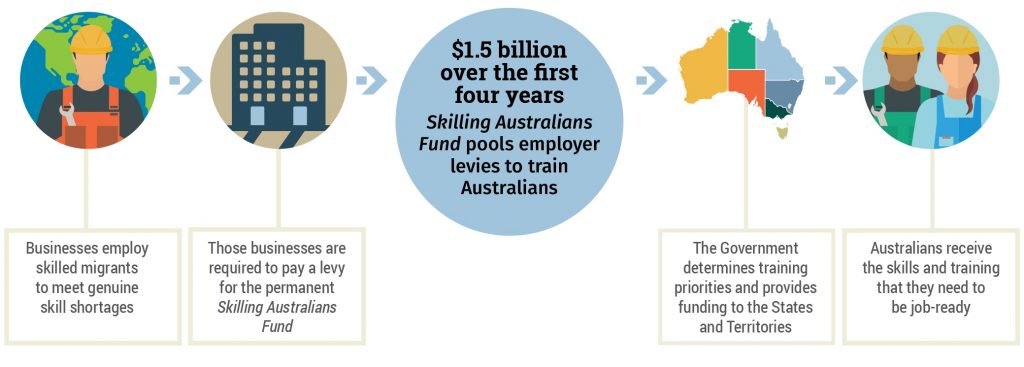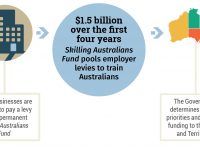(Written by Don Perlgut, CEO, Community Colleges Australia)
Last night’s Commonwealth Budget, brought down by Treasurer Scott Morrison, contains a few surprises and shows a marked turn to the centre of the political spectrum by the Turnbull Government. Of greatest importance to the VET sector is the new “Skilling Australians Fund” (see below). There are also regional and rural initiatives that may assist community education providers. On the other hand, the Government is continuing with a harsh approach to job-seekers, as the commentary by ACOSS and other peak social sector organisations (below) indicates.
Vocational Education and Training: The Skilling Australians Fund
The big announcement relating to VET is the new “Skilling Australians Fund”, superseding the National Partnership Agreement on Skills Reform, which expires on 30 June 2017: $1.5 billion over four years. Read the press release from Ministers Birmingham and Andrews here, and Minister Andrews' letter to Dr Don Perlgut.
Julie Hare and John Ross (education journalists) in The Australian report as follows:
Vocational education and training has been given an eleventh-hour reprieve after the federal budget included a $1.5 billion skills fund aiming to deliver an additional 300,000 apprentices and trainees over the next four years. In an unexpected move, the government will establish a permanent National Partnerships Skilling Australia Fund. The fund, which will require the states and territories to match funding, will give priority to apprenticeships and traineeships in occupations in high demand. It includes $350 million allocated as part of the government’s recently announced reform of the 457 Visa program.
The package came as a surprise. The skills sector had widely expected there would be no replacement for the National Partnerships Agreement on Skills Reform, which is due to expire on June 30. The move will help redress the inclusion of sub-bachelor programs in the demand-driven higher education system, which sector insiders were seeing as the final nail in the coffin for higher level qualifications in the vocational and TAFE sectors. That change will further pitch universities against TAFEs in an increasingly competitive post-school market that has seen rising numbers of students opt for university since 2012.
State Government comment: The skills and training ministers from the state Labor Governments of Victoria, South Australia, Queensland and Western Australia have issued a combined press release entitled "Turnbull’s Budget a Disappointment for Training and TAFE".
Rural and Regional Announcements
Comment: Rural and regional Australia looks like big winners in this budget, with a number of announcements. Of specific relevance to the community education and VET sector are the following.
Regional Growth Fund: The Regional Growth Fund will invest $472 million in regional infrastructure projects that back our regions’ plans to adapt to the changes taking place in the economy. This will include $200 million for a further round of the successful Building Better Regions Fund.
Rural and Regional Enterprise Scholarships: The Government will introduce new scholarships to improve access to educational opportunities for regional students. The “Rural and Regional Enterprise Scholarships” will support 1200 regional and remote students to undertake STEM (Science, Technology, Engineering and Mathematics) studies. The scholarships will be for vocational education, undergraduate and postgraduate students (Certificate IV to PhD) and valued at up to $18,000 each. These scholarships will support flexible study, including part-time and online students and they may include an internship to help students develop their professional experience. ($24million)
Regional Study Hubs: $15.2 million will also be allocated to establishment and operate eight regional study hubs for higher education students (although possibly not including VET) in rural and remote areas.
You can read the full Regional Budget Statement here, Minister Nash’s media release here, and the summary by the Regional Australia Institute here.
Young People and the Budget
Comment from Foundation for Young Australians (FYA) CEO, Jan Owen AM:
Further investment in needs-based education funding through Gonski 2.0 and support to young parents into the workforce through expansion of the ParentsNext initiative is welcome. However, the 2017 Budget has glaring omissions when it comes to building young Australians’ skills and capabilities to thrive in an increasingly complex world of work. The Budget failed to acknowledge that our current education model is not preparing young Australians for work. As FYA’s research highlights, while young people are now staying in education longer, it is taking them an average of 4.7 years after finishing to find a full-time job. With up to 31.5% of young people aged 15-24 unemployed or underemployed we need to be investing in a national enterprise skills and careers management strategy to better to prepare young people for the changing world of work. We also need to prepare young people to be more entrepreneurial and innovative so that they can be job creators, not just job seekers.
Other Social and Community Sector Comments about the Budget and Disadvantaged Australians
Australian Council of Social Service (ACOSS) CEO Dr Cassandra Goldie:
ACOSS welcomes the change of tack to invest in health, education and housing, but the 2014 Budget mindset to demonise and impoverish the most disadvantaged continues. The government is trying to put the 2014 horror budget behind it, securing the National Disability Insurance Scheme and putting housing affordability on the agenda but the government still neglects, blames and targets the most disadvantaged in the social security system. It’s time the government invested in jobs and unemployed people instead of penalising people for poverty. The modest investment in career counselling for older people who are unemployed, and linking of employment assistance with infrastructure projects shows the way forward but with unemployment projected to remain above 5% for four years, there’s much more to be done.
Father Frank Brennan, Chief Executive, Catholic Social Services:
This year’s Budget has once again imposed unnecessary additional pain on the neediest Australians, who through no fault of their own are unable to work hard to secure better days…. The Treasurer has said that the government is choosing to ‘focus on growing our economy to secure more and better paying jobs’ while at the same time conceding that there will be no increase in the labour market participation rate. Unemployment, which is presently sitting at 5.9%, is forecast to fall to only 5.5% by 2018-19. Even with optimistic projections, the government is expecting that unemployment will come down to only 5.25% by 2020-21. This concession makes the new mutual obligation rules for the unemployed and other welfare recipients punitive and onerous.
Tony Nicholson, Executive Director, Brotherhood of St Laurence
We know from our experience working with highly disadvantaged people that the challenges they face are much more complex than is being portrayed. The risk is that the proposed demerit system, devoid of administrative discretion and not accounting for a full understanding of individual circumstances, will cause increasing levels of homelessness through reduced and cancelled payments.... About half the homeless people sleeping rough on our streets are unemployed and rely on unemployment benefits. Payment rates are very low so they can't cover spiralling rents in our cities, let alone look for work and comply with Centrelink job search requirements.
Dr Jim Stanford, Director of the Centre for Future Work:
The budget reveals a government that is still very much wedded to a ‘trickle-down’ vision for Australia’s economy and society. And the measures announced today will clearly exacerbate inequality and further undermine wage growth. The budget itself does not indicate any enormous expansion in capital spending. In fact, net capital spending is projected to decline in 2017-18 (to just $0.5 billion, the smallest since 2002-03). In essence, in the first year of the budget, the government will spend barely enough to offset depreciation of existing assets. There is no concrete evidence that this budget will accomplish the real and sustained increase in Commonwealth government capital spending that is needed. Commonwealth capital spending has declined in recent years compared to earlier decades, and there is no evidence that this budget will change that trend.
Summary Conclusions
From Bernard Keene, Politics Editor of Crikey:
After more than 18 months of being accused of being captive of the right of their party, Malcolm Turnbull and Scott Morrison have shifted radically to the centre in a desperate move to save their government. Tonight’s 2017 budget is a tax-spend-and-borrow document designed to appeal to voters’ populist instincts. Strip the names and dates off this budget and it could easily be mistaken for a Labor budget.

In response:
The Skills and Training Ministers from the states of Victoria, Queensland, South Australia and Western Australia released the a press statement, calling Turnbull's budget a disappointment for training and TAFE.





